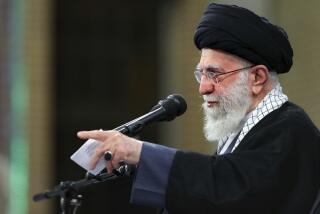SOUTH AMERICA : Protesters Vigilantly Demand Justice in Argentine Bombing : Little progress has been made in investigation of fatal blast at Jewish community center. Weekly gatherings keep pressure on.
- Share via
BUENOS AIRES — Since July 18, when a terrorist car bomb destroyed this nation’s main Jewish community center, demonstrators have gathered every Monday morning in front of the central courthouse here. “Justice, justice!” they demand.
But so far, little apparent progress has been made in judicial and investigative efforts to bring the bombers to justice.
Eighteen people have been detained for questioning. Seventeen have been released for lack of evidence. Carlos Alberto Telleldin, still under arrest, owned the minivan used in the bombing, but it is unclear whether he was involved in the terrorist plot.
Early in the investigation, federal Judge Juan Jose Galeano issued international warrants for the arrest of four Iranian diplomats. Iran, which has denied any connection with the bombing, protested vigorously. The Argentine Supreme Court later invalidated the warrants, ruling that Galeano had not presented enough evidence.
This week, the judge insisted in an interview with an Argentine newspaper: “All the evidence I have been gathering has confirmed, little by little, the original hypothesis that it was a fundamentalist terrorist attack carried out by the Iranian diplomats who were implicated earlier.”
Iran has been linked to terrorist attacks in the Middle East by Hezbollah, a fundamentalist Muslim terrorist group. Argentine Jewish community leader Ruben Beraja, who has had access to Galeano’s 5,000-page case file on the July 18 attack, said evidence against Hezbollah or associated terrorists is conclusive.
“There is no room for doubt that the attack came from that sector,” Beraja told The Times. He said recent testimony by former State Department official Steve Emerson, an expert on Middle East terrorism, supports that conclusion. What is lacking, Beraja said, is incriminating evidence against individuals.
Galeano based his accusations against Iranian diplomats on testimony from Iranian defector Monoucher Motamer, who was questioned by the judge in Venezuela. Motamer’s credibility has been challenged. Galeano has said he wants to question him again but is having trouble finding him. Motamer is now thought to be hiding in the United States, according to Argentine press reports.
Part of Galeano’s investigation has focused on Iranians who came to Argentina in the weeks before the bombing. “There was a lot of movement of persons who came as diplomatic couriers and could be involved,” Beraja said.
But Beraja said no progress has been made in efforts to identify individuals who may have provided local support for the bombing. One problem for investigators, he said, is that collaborators probably worked in small cells, each with a limited role and little knowledge about the work of others.
Beraja, a lawyer and banker, is president of the Argentine-Jewish Mutual Assn., whose building was destroyed in the blast. In the days after the attack, nearly 100 people were reported dead, but he said the confirmed toll now stands at 87.
The Argentine Jewish community increasingly worries that the terrorists’ trail is growing cold, he said. Adding to concerns is the fact that a similar 1992 bombing of the Israeli Embassy here remains unsolved. Some blame inefficiency in the Argentine criminal justice system for the failure to track down the terrorists in both cases.
“There are people who are very disillusioned, very skeptical,” said Sergio Widder, who was among 200 people who gathered at the courthouse on Lavalle Street on Monday morning. Participants were invited to sign a petition demanding “the justice that brings peace.” And at 9:53 a.m., the time of the July 18 bombing, protesters observed a minute of silence, as they have every week since that bloody Monday morning.
More to Read
Sign up for Essential California
The most important California stories and recommendations in your inbox every morning.
You may occasionally receive promotional content from the Los Angeles Times.













